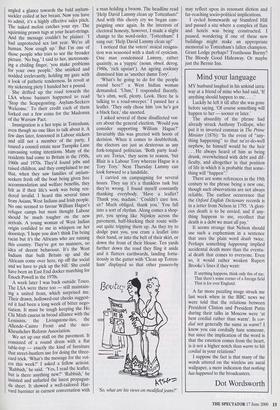Mind your language
MY husband laughed in his unkind iatric way at a friend of mine who had said, 'If anything should happen to me..
Luckily he left it till after she was gone before saying, 'Of course something will happen to her — sooner or later.'
The absurdity of the phrase had already struck Anthony Trollope, who put it in inverted commas in The Prime Minister (1876): 'In the event of "any- thing happening" to that ne'er-do-well nephew, he himself would be the heir . . He always heard of him as being drunk, overwhelmed with debt and dif- ficulty, and altogether in that position of life in which it is probable that some- thing will "happen"?
There are some references in the 19th century to the phrase being a new one, though such observations are not always reliable. The earliest occurrence that the Oxford English Dictionary records is in a letter from Nelson in 1795. 'A glori- ous death is to be envied; and if any- thing happens to me, recollect that death is a debt we must all pay.'
It seems strange that Nelson should use such a euphemism in a sentence that uses the plain word death twice. Perhaps something happening implied accidental death more than the eventu- al death that comes to everyone. Even so, it would rather weaken Rupert Brooke's lines if they went:
If anything happens, think only this of me: That there's some corner of a foreign field That is for ever England.
A far more puzzling usage struck me last week when in the BBC news we were told that the relations between President Clinton and President Putin during their talks in Moscow were 'at best cordial rather than warm'. Is cor- dial not generally the same as warm? I know you can cordially hate someone, but since the implication of the word is that the emotion comes from the heart, is it not a higher notch than warm to hit cordial in your relations?
I suppose the fact is that many of the words uttered on the wireless are aural wallpaper, a mere indication that nothing has happened to the broadcasters.
Dot Wordsworth










































































 Previous page
Previous page